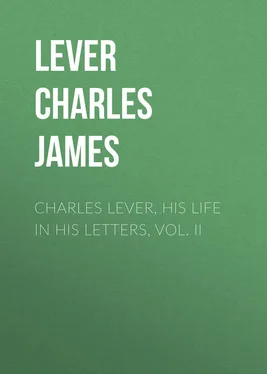Charles Lever - Charles Lever, His Life in His Letters, Vol. II
Здесь есть возможность читать онлайн «Charles Lever - Charles Lever, His Life in His Letters, Vol. II» — ознакомительный отрывок электронной книги совершенно бесплатно, а после прочтения отрывка купить полную версию. В некоторых случаях можно слушать аудио, скачать через торрент в формате fb2 и присутствует краткое содержание. Жанр: foreign_antique, foreign_prose, на английском языке. Описание произведения, (предисловие) а так же отзывы посетителей доступны на портале библиотеки ЛибКат.
- Название:Charles Lever, His Life in His Letters, Vol. II
- Автор:
- Жанр:
- Год:неизвестен
- ISBN:нет данных
- Рейтинг книги:5 / 5. Голосов: 1
-
Избранное:Добавить в избранное
- Отзывы:
-
Ваша оценка:
- 100
- 1
- 2
- 3
- 4
- 5
Charles Lever, His Life in His Letters, Vol. II: краткое содержание, описание и аннотация
Предлагаем к чтению аннотацию, описание, краткое содержание или предисловие (зависит от того, что написал сам автор книги «Charles Lever, His Life in His Letters, Vol. II»). Если вы не нашли необходимую информацию о книге — напишите в комментариях, мы постараемся отыскать её.
Charles Lever, His Life in His Letters, Vol. II — читать онлайн ознакомительный отрывок
Ниже представлен текст книги, разбитый по страницам. Система сохранения места последней прочитанной страницы, позволяет с удобством читать онлайн бесплатно книгу «Charles Lever, His Life in His Letters, Vol. II», без необходимости каждый раз заново искать на чём Вы остановились. Поставьте закладку, и сможете в любой момент перейти на страницу, на которой закончили чтение.
Интервал:
Закладка:
From Mr John Blackwood.
“ April 27, 1864.
“I am particularly obliged to you for the promptitude with which you did the bit about Garibaldi. It is, I think, the best thing that has been written about the General, and I hope he is worthy of it. You will see that the Garibaldi fever has been cut short, so that I shall have no opportunity of using the note of introduction you so kindly sent, but I am equally obliged. Fergusson (Sir William), the surgeon, is a very intimate friend and old ally of mine, and I have no doubt he has given genuine and sound advice. Garibaldi would doubtless have had innumerable invitations to No. 9 Piccadilly, and I hope the hero has not damaged himself. I have half a mind to write this joke to Fergusson, and call for an explicit statement of the hero’s health. Seriously, he is well away at the present crisis, and we are making sufficient fools of ourselves without this wild outbreak of hero-worship…
“Laurence Oliphant stayed with us for three days, and we had a ‘fine time.’ I never saw such a fellow for knowing people, pulling the wires, and being in the thick of it always. He is hand-and-glove with half the potentates and conspirators in Europe. Skeffy in his wildest flights is a joke to him. There is, however, no humbug about Oliphant; he is a good fellow and a good friend. He talked much of the pleasant days he had passed with you, and begged particularly to be remembered to you all. Knowing I could trust him, I told him the secret, the importance of keeping which he fully appreciated, and will assist in throwing people off the scent, which ‘O’Dowd’ will, I think, put a good many upon. There have been surmises in the papers, but surmises are nothing. How is ‘Tony’ getting on, and the new ‘O’Dowd’? I wish, indeed, we had come across each other in earlier life; but it is no use your talking of being seedy, – you are evidently as fresh as paint, and never wrote better, if so well.”
To Mr John Blackwood.
“Casa Capponi, Florence, May 5, 1864.
“I have just got home and found your note and its enclosed cheque. Why this should be so large I have no idea nor any means of guessing, for the Mag. has not yet arrived. You are right about the ‘Devil,’ but he alone knows when and how I shall be in the vein to go on with his experiences. I had to come back here hurriedly, which requires my returning to Spezzia in a day or so, a sad interruption to work, and coming awkwardly too, as I am driven to change my house, – the old jaillike palace I have lived in for fifteen years has just been bought by Government, and I am driven to a villa at some distance from Florence – a small little crib nicely placed in a bit of Apennine scenery, and quiet enough for much writing.
“I entirely agree with all you say of Oliphant: he is an able fellow, and a good fellow; and there is no blague whatever in his talking familiarly of ‘swells,’ for he has lived, and does live, much in their intimacy. He is not popular with the ‘Diplos.’ nor F. O., but the chief, if not only, reason is, that he is a far cleverer fellow than most of them, and has had the great misfortune of having shown this to the world.
“I want much to be at ‘Tony’ again, but it will be some three or four days before I can settle down to work. When I have dashed off enough to send I will, even though not enough for a number.
“I see by ‘The Telegraph’ that the fleet is to go to the Baltic, but not for more than a demonstration. Does not this remind you of the Bishop of Exeter’s compromise about the candles on the altar, ‘That they might be there, but not lighted.’ I believe, as a nation, we are the greatest humbugs in Europe; and, without intending it, the most illogical and inconsequent people the world ever saw.
“I hope your little people are all well again and over the measles and in the country with you, and that you are all as happy as I wish you.
“Supply the date of the Reform Bill for me in the ‘New Hansard.’”
To Mr John Blackwood.
“Casa Capponi, Florence, May 10, 1864.
“Herewith go three chapters of ‘Tony.’ With the best will in the world there are days when our dinners go off ill, our sherry is acrid, our entrées cold, and our jests vapid. Heaven grant (but I have my misgivings) that some such fatality may not be over these ‘Tonys.’ My home committee likes them better than I do; I pray heartily that you be of this mind.
“I shall be fretful and anxious till I hear from you about T. B., but I go off to-morrow to Spezzia, and not to be back till Wednesday the 18th, – all Consular, all Bottomry, all Official for eight mortal days, but
“Of course I must show to the office ‘I’m here,’
And draw with good conscience two hundred a-year.
I’d save fifty more, but of that I am rid well
By the agency charges of Allston and Bidwell.”
To Mr John Blackwood.
“Florence, May 15,1864.
“More power to you! as we say in Ireland, for your pleasant letter. I have got it, and I send you an O’D. I think you will like on ‘Our Masterly Inactivity,’ and another on ‘Our Pensions for Colonial Governors.’
“As to next month’s O’D., I don’t know what will turn up; but [I am] like poor old Drury – the clergyman at Brussels – whose profound reliance on Providence once so touched an English lady that it moved her to tears. ‘He uttered,’ said she – telling the story to Sir H. Seymour, who told it to me – ‘he uttered one of the most beautiful sentiments I ever heard from the lips of a Christian: “When I have dined heartily and well, and drunk my little bottle of light Bordeaux, Mrs S.,” said he, “where Mrs Drury or the children are to get their supper to-night or their breakfast to-morrow, I vow to God I don’t know, and I don’t care .”’ Now if that be not as sweet a little bit of hopeful trust in manna from heaven as one could ask for, I’m a Dutchman, and I lay it to my heart that somehow, somewhere, O’Dowderies will turn up for July as they have done for June, for I shall certainly need them. You will have had T. B. before this. I see you are stopping at my old ‘Gite,’ the Burlington, my hotel ever since I knew London. There was an old waiter there, Foster, – I remember him nigh thirty years, – who exercised towards me a sort of parental charge, and rebuked my occasional late hours and the light companions who laughed overmuch at breakfast with me in the coffee-room. If he is in vivente , remember me to him.”
To Mr John Blackwood.
“Florence, May 16,1864.
“I have just had your note, and am relieved to find that I have not lost the ‘Colonial Governors,’ which I feared I had. I have added a page to it. I have re-read it carefully, but I don’t think it radical. Heaven knows, I have nothing of the Radical about me but the poverty. At all events, a certain width of opinion and semi-recklessness as to who or what he kicks does not ill become O’D… whose motto, if we make a book of him, I mean to be ‘Tros Tyriusve mihi nullo discrimine agetur,’ —
“I care not a fig For Tory or Whig,
But sit in a bowl and kick round me.
“Though the paper I sent yesterday on ‘Our Masterly Inactivity’ would be very apropos at this juncture, there will scarcely be time to see a proof of it, seeing that it could not be here before this day week. If you cannot revise it yourself, it will be better perhaps to hold it back, though I feel the moment of its ‘opportunity’ may pass. Do what you think best. My corrections of the proof I send off now will have to be closely looked to, and the MS. is to come in between the last paragraph and the part above it.”
Читать дальшеИнтервал:
Закладка:
Похожие книги на «Charles Lever, His Life in His Letters, Vol. II»
Представляем Вашему вниманию похожие книги на «Charles Lever, His Life in His Letters, Vol. II» списком для выбора. Мы отобрали схожую по названию и смыслу литературу в надежде предоставить читателям больше вариантов отыскать новые, интересные, ещё непрочитанные произведения.
Обсуждение, отзывы о книге «Charles Lever, His Life in His Letters, Vol. II» и просто собственные мнения читателей. Оставьте ваши комментарии, напишите, что Вы думаете о произведении, его смысле или главных героях. Укажите что конкретно понравилось, а что нет, и почему Вы так считаете.








![William Frith - John Leech, His Life and Work. Vol. 1 [of 2]](/books/747171/william-frith-john-leech-his-life-and-work-vol-thumb.webp)

![William Frith - John Leech, His Life and Work, Vol. 2 [of 2]](/books/748201/william-frith-john-leech-his-life-and-work-vol-thumb.webp)

